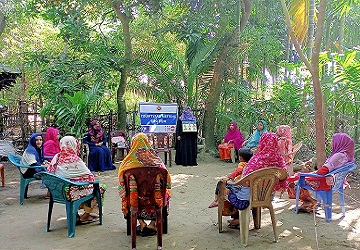Research and Evaluation
RTMI’s research unit has conducted over 100 studies during the last ten years for government, NGOs, Private Sector, and International Organizations. During this period RTMI conducted and developed studies including the data collection tools and instruments, as appropriate and finalized them in consultation with the client. Different innovative approaches were also developed for understanding both rural and urban communities of Bangladesh. Some examples of the major study themes/areas are: Nation-wide surveys- e.g. Utilization of Essential Service Delivery (UESD) Survey, Assessing Utilization of Satellite Clinic, Data collection, editing and data entry for Bangladesh Urban Health Survey (BUHS), Baseline studies (e.g. Max Nutri-WASH’ project, Urban Pilot Project on IFA Supplements among Pregnant Women, Food Security 2012 Bangladesh-Ujjibito project of PKSF), KAP studies, formative research, policy research, facility/service surveys, perception studies, Public Expenditure Review, Benefit Incidence Survey, Costing/PROFILE study, program/project evaluation, review of Social Protection programs, studies on Governance, Assessment for Implementation of Tribal Health Plan, Household level tracking survey on critical program indicators, Cross-border and in country livestock and livestock products market assessment, Behavioral Change Research on Homestead Garden choices and Men’s Food purchasing, teaching in primary school classrooms: Do teachers understand and use interactive teaching, Rapid Qualitative assessments, review and assessment of issues related to health care financing and health Economics, Facility survey for monitoring pro-poor performance, inputs, quality of record keeping and satisfaction, conducting scoping studies, review of better health for the urban poor project of DFID, etc. A list of major studies conducted by RTMI is attached for better understanding.
Partnership and collaboration with different research organizations and universities is increasingly becoming a key strategy of our research program. Currently, we are implementing two multi-year collaborative project with Johns Hopkins University (JHU) on “A Ring Water, Sanitation, and Hygiene Intervention to Reduce Cholera in Hotspots in Bangladesh (February 2022 to May 2025)” and “Testing a scalable model of the Cholera Hospital-Based Intervention (February 2022 to June 2025)”.
With enriched expertise and experience, RTMI has now been recognized as a regional partner in conducting joint inter-country assessments. In this series, RTMI has recently conducted the “National Needs Assessment-Midwifery Workforce for Bangladesh”, as part of H4+ initiative being conducted in eight high burden countries in maternal and infant mortality. With funding support from Rockefeller Foundation, RTMI conducted “Comprehensive situation assessments of health professional education in Bangladesh” supporting the five-country initiative on health professional education research covering doctors, nurses and public health specialists. On being commissioned by US Department of Labour, RTMI worked with ICF-Macro in conducting the research on child labour in informal garment sector of the country. RTMI has also implemented an operational research project on ‘Demand Based reproductive Health Project’ in close collaboration with the Population Council and ICDDR’B. Recently it has implemented an Operations Research Project to Improve Quality of MR and PAC Services in Bangladesh. The research interventions are carried out in 10 selected public and private facilities. The Research Unit of RTMI has dedicated space, equipment, training facilities and staff members for data entry and processing. RTMI works in close association and partnership with other organizations and universities and maintains a data base of consultants and resource persons.
Conducting Research and Evaluation for different in-country projects and donor evaluations for years, RTMI has now expanded its operational services to international organizations who are bidding and been contracted research/evaluation works but don’t have any in-country presence. The German Consultancy Sustainability Agent (SUSA) has used RTMI resources in assessing needs for improving working conditions of suppliers factories (in Bangladesh), Social Impact (SI) an US based organization partnered with RTMI in evaluating Governance related activities funded by USAID, Abt Associates, another US- based organization, partnered with RTMI to undertake assessment assignments pertaining to demand side financing of the maternal voucher scheme pilot of the Government of Bangladesh and costing of maternal health services. Nordic Consulting A/S, a Danish consulting firm, sub-contracted data collection of Basic service provisions in Chittagong Hill Tracts. In 2011, Australian Council for Educational Research worked with the Research Unit for conducting study on interactive Teaching in Primary School Classrooms of the country; and ICF-Macro has sub-contracted RTMI for conducting research on Child Labor and Forced Child Labor in Informal Garment Production in Bangladesh and many other similar studies and operational research activities. In the recent past years alone, RTMI has worked with more than 25 US and Europe based and other international organizations including John Snow Inc. (JSI/USA), John Hopkins University (JHU/USA), Abt. Associates, Helen Keller International (HKI), Australian Council for Educational Research (ACER), ICF-MACRO, PATH, FHI, Academy for Educational Development, the Union, Micronutrient Initiative, Aberdeen University/ IMMPACT (UK), Swiss-Contact and Nordic Consulting Group. Some examples of the major studies are Public Expenditure Review of MOHFW, multi-country study on sexual behavior of Injectable Drug Users (IDU), Multiple Indicator Cluster Survey (MICS) for UNICEF, maternal health status evaluation, Nutrition PROFILE study, etc. It has also conducted the Behavioral Surveillance Survey (2007) which is undertaken on an annual basis to document behaviors leading to vulnerability for HIV infection among selected population groups and to determine trends of behaviors over the rounds of surveillance. RTMI has also conducted the Benefit Incidence Analysis (BIA) study for the Health Economics Unit of the Ministry of Health and Family Welfare (MOHFW) to determine who benefits from public health expenditure in Bangladesh health sector according to criteria such as: age, sex, and socio-economic status. In addition, under its Private Sector Health Program, RTMI has conducted many market assessment studies on policy issues, accreditation procedures, training systems and HRH supply-demand gap.
-
Current Information
-
Activities Pictures
RTM International are implementing Health Support and research activities in the different Districts of Bangladesh which are funded by different Donors.
RTMI-UNFPA Project

Courtyard meeting organized by RTMI-UNFPA
